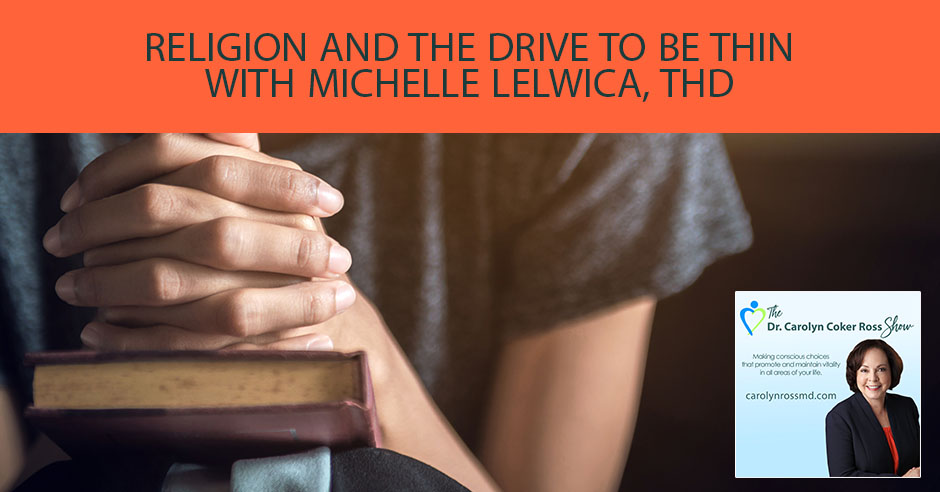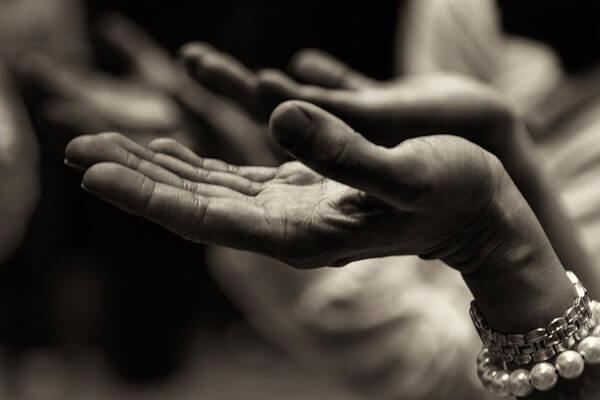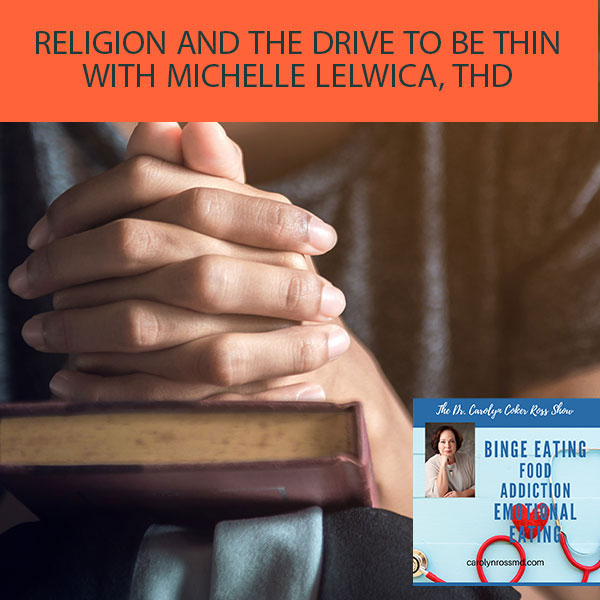
Carolyn Coker Ross and guest Michelle Lelwica, ThD explore the spiritual dimensions of eating and body image problems, including the ways women’s relentless pursuit of thinness serve what has historically been a religious function insofar as this quest provides a sense of meaning, even though it fails to deliver the “salvation” it promises. Join this insightful discussion with Michelle as she explains the religion of thinness and how the American culture has recycled and repurposed some traditional Christian narratives about women’s bodies, and these narratives shape many women’s attitudes towards their own bodies, whether or not they are Christian (or religious).
—
Listen to the podcast here:
Religion And The Drive To Be Thin With Michelle Lelwica, ThD
Eating And Body Image Issues As A Spiritual Hunger
My guest is Michelle Lelwica. She is a Professor of Religion at Concordia College in Moorhead, Minnesota, where she teaches courses on the intersection of religion, gender, culture and the body. We’re going to be talking about what women are hungry for and why we’re obsessed about food and weight and whether that’s spiritual hunger. To tell you a little bit more about Michelle, she did her graduate work at Harvard Divinity School where she received a Master’s of Theological Studies in Christianity and Culture and a Doctorate of Theology. She’s the author of three books, the latest of which is Shameful Bodies: Religion and The Culture of Physical Improvement. She also has the book The Religion of Thinness and one other book, Starving for Salvation: The Spiritual Dimensions of Eating Problems. Welcome, Michelle. It’s great to have you.
Thank you so much for having me.
How did you first get interested in this topic? It’s a unique niche under religion.
When I was in graduate school, I told my dissertation advisor that I wanted to, and I went to graduate school in religion. When I told her that I wanted to focus on eating problems and body image problems, her first response was, “What?” It didn’t take long for her to start connecting the dots that I was already seeing between the historical attitudes towards women’s bodies in the history of Christianity in particular. That was my focus because that’s the tradition that’s had the most power to influence the body norms, the cultural norms and the gender norms of American culture, which was my focus.
Let’s dive into that a little bit because, in your book, you talk about how the religious patriarchy fostered this religion of thinness. How did religion get into women’s bodies?
Historically, the focus on thinness is relatively new. When I think about the history of Christianity going back 2,000 years to the religious patriarchy, the dominant male leaders of the church were not interested in keeping women thin, but they had other ways of trying to control women’s bodies. A lot of it started with perceptions of women.

Religion Of Thinness: In the course of the 20th century, we’ve come to associate thinness with social privilege.
Why did they want to control women’s bodies? Was it the sinfulness that women’s bodies provoked in them that they have in women?
The key thing that you said is in them. I think a lot of it was projection. If we can go straight to the story of Eve, what a story. That was my epiphany once I started looking at that story in graduate school. I had grown up with that story. I was raised Catholic and understood the story of Adam and Eve. I could tell you about it by heart. It was in graduate school when I was looking at in the larger context, religious leaders, male leaders’ attitudes towards women’s bodies. This story was something that especially the early church leaders returned to repeat again and again as evidence for women’s inferiority.
The fact that Eve ate the apple made her weak?
Yes. What’s funny is most of us think of it as an apple because that’s the artistic tradition. It’s actually a piece of fruit. The idea that what the church fathers say again and again, and this is many of them repeat the same story, that Satan never would’ve tempted Adam, but Satan went for the gullible, weaker, more sin-prone, more flesh prone of the two, and that was Eve. The particular epiphany for me was starting to think about what you did to bring sin and shame into the world. As a religion scholar, I see this as a creation myth. Religion scholars don’t think there was a person named Adam and Eve in some garden somewhere. We see this as a creation myth. Even so, the symbolism is heavy when you recognize that it is the act of a woman eating that brings sin and death into the world. It’s about the shame ethos of that eating. Eating and it’s the act that brings sin, not just sin, but shame and death into the world. That’s the transgressive act. It’s a woman eating. I talked to my students, I teach college students, and so I talked to them about their sense of eating.
Can you eat with freedom or do you feel a sense of shame? These are women who are young and smart and they have all kinds of goals. Still, this sense of shame surrounds them in their relationship with food. I’m not saying that the authors of that creation myth had the intention of making women feel like they have to watch their weight or count calories. It’s not like that, but it’s the same symbolism of associating female appetite with shame and sin. That became, for me, the epiphany that made me feel like we’ve got so much to uncover here in terms of the history of attitudes towards women’s bodies in Western culture.
How did it move a little further as history progressed from Eve into it being about their thinness? That part of it you say in your book has to do with the higher-class women were expected to be thin in contradistinction to women who were poorer or from less financially up their backgrounds.
No, it’s true. In the course of the twentieth century, we’ve come to associate thinness with social privilege. We see this repeatedly through media images. Thinness gets associated with wealth. It’s often associated with heteronormativity. I don’t know if that’s a word your readers are familiar with. We use that in academics. The idea most people are and should be heterosexual. The idea of the thin woman with the beefed-up man is part of that social privilege.
Let’s put a little bit about how the media does that. I know you pick apart some ads in your book, but can you give us one that maybe people might’ve seen before that gives us that sense of why that’s associated with privilege?
[bctt tweet=”Practice peaceful, nonviolence towards your body. ” username=”CarolynCRossMD”]I try to limit my consumption of media. I don’t watch TV very much, so it’s hard for me to pull out an advertisement off the top of my head. We’ve all been exposed to, for example, with this new diet plan in just four weeks. You can become thin and happy and then you’re paying money for the diet plan or the fitness plan. Think of how many of the celebrities have personal trainers or eat caviar for lunch or whatever. The association is the more money you have, the more you can spend on perfecting your body. It’s not even just advertisements. I think it’s within the celebrity culture that celebrities who have babies and then they lose all of their baby weight right away because they have these personal trainers, special diets and all of this money to spend on keeping their bodies perfect.
There are also some racial implications of that as well. I speak a lot about African-American women who have eating disorders and doing your historical research on that. White elite women compared to black women’s bodies and black women’s bodies were demonized and thought to be disgusting, shameful or whatever the terms were.
I’m completely happy you brought that up. I mentioned it in my first book that thinness is a white ideal. It’s a white privilege ideal and then the implications of that are so deep. When you think about it then if you’re a white woman and you’re hardcore in getting the thinner perfect body and you associate thinness with perfection, you are pursuing a white Western ideal that has a colonial history. Indirectly you may have the best of intentions of becoming healthier, more beautiful or whatever, but you’re participating in a racist ideal. White women need to wake up to that. If nothing else, we need to disengage from this thinness mania because it’s got racism in it.
That’s a whole new cut. In your book, you talk about the myth of thinness and whether it is a fact versus socially fabricated fiction and not the media has perpetuated, but also the medical profession has perpetuated it. I was talking to someone about some of the shame that I have as a physician having been educated that obesity, you can’t equate that with health. You can’t be healthy no matter what your size is. You have to lose weight. Even though I wasn’t one of the worst purveyors, I never did put people on diet pills or went to extreme guiding. In the early parts of my career, I did feel that you had to lose weight to be healthy. Now I’m clear that is wrong. There is some regret that I was involved in that early in my career.
There’s also some beauty in your story of being willing to grow and professionally you’ve grown beyond a limited knowledge and you’ve opened yourself to new perspectives. I talk about that myth. I think of it as a salvation myth. I’m a religion scholar, so I look at our culture and I see many salvation myths. I think of those myths as the promise of happiness and the promise of health.
You’ll be saved if you’re thin is you’re saying.
Yes, you will be saved. The word says salvation or saved etymologically means good health. The salvation of thinness is this idea that we will be healthy and whole. Wholeness is another word for salvation. That myth has in its secular form, the salvation myth says you will be happier and healthier if you’re thinner.
That is such a difficult myth to overcome. Because of this is the work I do, I have a program where I work with people online to talk about how to get rid of their obsessions with food and to teach that they can be healthy at every size. That particular thing, especially the link in their minds between weight and health, it is the hardest one to move past.

Religion Of Thinness: Our pursuit of thinness involves our sense of morality and the idea that thinner is not just healthy or more beautiful but better in a moral way.
What’s funny about it is we know it’s not true. We know that being healthy doesn’t involve obsessing about every single little calorie or fat gram or getting every single moment you spend on the treadmill. That hope is much bigger than that. We know that intellectually. I think you’re right, it’s ingrained in us and that message is repeated and widespread. What tactics do you use to try to undo that message?
That’s pretty in-depth. It’s not any one thing. That’s the other problem that I face in my work is everybody is conditioned to want one solution. I’ll go on this diet and everything will be fine. It never is. There are 5, 10, 15 diets. Women are starting to wake up a little bit to the fact that dieting doesn’t work. It’s hard to wake up to the fact that obesity or weight obsession is complex. Part of it is that women believe in their hearts that they need to lose weight. It’s like a heartfelt belief that’s hard for them to give up. It takes quite a bit of time.
This goes back to what you were asking me about with the historical church fathers. There’s such a long history in religion and religion seeps right into culture. It’s in our cultural DNA, the history of viewing women’s bodies as inadequate. We’ve had not just centuries, but millennia of seeing women’s bodies as flawed, as sinful and somehow needing to be monitored, supervised, saved, and that we can’t flick a switch and change our minds about it. It takes a lot of conscious retraining and awareness of when those voices and those historical patterns of seeing our bodies as inferior or inadequate.
The culture is strong around this issue that I admit makes it difficult for women to buck the tide. Everyone is going in this direction to the next great fad diet and all the hope of I can lose weight and I’ll finally be happy and healthy and to be going swimming against the tide is extremely difficult. In your book, you also talk about the Christian diet movement. I didn’t know. Tell us a little bit about it.
I discuss it in the context of looking at the way that much of our pursuit of thinness involves our sense of morality and the idea that thinner is not healthy or not more beautiful but better in a moral way. We talk about the thin body is a good body and good is a moral term. This is pervasive in culture, but it’s crystallized this moralizing of thinness in the Christian diet movement. Lots of Christian diet authors are Christian. They’re evangelists for thinness. We’re advocating that God wants you thinner. God intended everybody to be thin and that if you are not thin, you are in a sense wearing your sin on your body. Your fatness or your extra weight is in this paradigm of Christian dieting is a sign of your idolatrous relationship with food, your inability to control or tame your sinful appetite. It’s heavy and it’s shaming.
Is it Christianity that has done a number on women and their bodies? Is this pretty much across the board?
The bad news is each tradition has its patriarchal parts. Each tradition, whether you’re talking about Judaism, Islam, Hinduism or Buddhism, they all have messages that suggest that women are inferior beings, less capable of spirituality. I like to think of patriarchal religion as one side of every tradition, but it’s not all of the tradition. There are plenty of Christian feminists, Jewish feminists, Hindu feminism, Buddhist and Muslim feminists who understand. They don’t deny the patriarchal traditions that privileged men and favor male bodies and associate men with spirituality in women with carnality. They don’t deny those patriarchal aspects, but they also find within the tradition empowering elements.
Does every tradition have this religion of thinness going on?
[bctt tweet=”To practice peace with our bodies is to learn to relate to our bodies as more than an image. ” username=”CarolynCRossMD”]That’s a hard question for me to answer because I haven’t studied the other traditions in-depth enough, but I will say that there’s fear of female bodies and fear of female appetites in all of the traditions. Maybe less so in some of them, but certainly even in ancient Buddhism, there are texts that suggest that women’s appetites are suspect.
Why are men afraid of women?
That’s such a great question because when I ask students, we’ll read these historical texts that the church fathers are going on about women being sin-prone and carnally-driven, where men are oriented by reason, rationality and spirit. I’ll ask students, “What do these texts tell us about women?” They’ll think about it for a while and eventually they realize they don’t tell us anything about women. They tell us about men’s projected fears.
Say a little bit more about why women’s obsession with food in there and with thinness is spiritual hunger.
I think about spirituality as involving a sense of purpose. Maybe backing up a little bit. My own research is this is true for a lot of us who work in this field, has roots in my own experience in the historical experience of struggle with body image and an adolescent eating disorder. When I think back to that experience and look at the stories of women I’ve studied, there’s a common thread of how the pursuit of thinness creates a sense of purpose. If that becomes your sense of purpose, in a sense, it’s a false sense of purpose because it doesn’t satisfy the need.
You can never fill that hunger that you have with food.
You can never fill it with food and you’ll never fill it with thinness. Even people who are recovering from eating disorders will tell you that even when I achieved my goal of thinness, I still felt that emptiness.
I’ve had women describe it as being career dieters.

Religion Of Thinness: Cultural criticism is a spiritual practice. It’s basically looking and cultivating a critical awareness of the messages that you’re being surrounded with.
What are the deeper needs behind the pursuit of thinness? We think that being thin will make us happy. We think that being thin will make us healthier. We think that being thin will make us good and acceptable in the eyes of others. What are the deeper needs? Thinness is a superficial strategy for meeting those needs. I think of the self-loathing that many women direct towards themselves in their pursuit of thinness as a spiritual crisis. I’m not talking about spirituality as you have to believe in God. I’m talking about it as where do you get meaning in your life? If your primary source of meaning is pursuing thinness, that is a pretty bankrupt source of meaning. We need deeper sources of meaning to help us grow if we don’t want to stunt our own growth by having a superficial goal like thinness be the source of meaning for our life. I don’t want to sound too mental about that. I have much empathy because I’ve been there. Art culture rewards women for being superficial. Think about all of the untapped power women have if we could stop being so superficial about things.
That’s exactly what I always say. I often ask women how much of your time and energy are you spending thinking about food and your body? Many times, it can be 50% to 70% to 80% and I think what a waste of female human capital.
I wonder if where we haven’t been able to change the tide of the direction of this world. I love that idea. Much of our female energy has been hijacked.
It is hijacked and distracted over here so we can’t grow personally and we can’t grow creatively. We can’t fulfill our potential as humans.
It’s funny that you say that because I think a turning point for me, even though I had stopped my eating disorder behavior by the time I went to college. I went to college in 1982, so words like anorexia and bulimia were not widespread. By that time stopped that behavior, I still had what I call an eating disorder mentality. It was honestly when I was introduced to feminism that things changed for me. I had a negative view of feminism prior to making the connections. I remember my college boyfriend asked me, “What do you think about feminism?” I said, “That’s for women with low self-esteem.” Can you imagine? Three years in the thick of a bad eating disorder as a high school student and pretty low self-esteem.
Once I started to understand why feminists were upset about the way women have been treated in society and how systemic sexism is. Once I started to understand that, I realized for the first time that my negativity, self-loathing and self-hatred and I never got enough dictatorship I had going on with myself was not an individual pathology. There was something bigger going on. An epiphany came for me when I realized I was sick of living in that prison of self-obsession. What I wanted to do was change the world, not my thighs. I had this big focus on I wanted to have thin thighs. I’m never going to have thin thighs. I was born with thick thighs, so that’s okay. They’re voluptuous. At the time, all I could think about was that it was what I wanted to change. The spiritual epiphany for me was now I want to change the world. I want to participate in making this world a better place, not just making my body so-called better under somebody else’s definition of better.
It’s someone else’s definition and one that’s not even scientifically anchored. One of the other things that caught my attention from your book is cultural criticism. Because when the women I work with start to let go of that diet mentality, they’re still in a sea of the diet mentality. It’s the norm. In your book, you tell people how to deal with that. Can you give us a brief synopsis?
Cultural criticism, I think of it as a spiritual practice. It’s basically looking and cultivating a critical awareness of the messages that you’re being surrounded with. A lot of this means paying attention to the media. That includes social media as well. I don’t do social media, but my students do and they tell me it’s one of the most toxic environments for them comparing themselves to other people and berating themselves and feeling inadequate. Cultural criticism is looking at an image, for example, a popular image or even a media icon, a celebrity or something, or an advertisement and asking yourself, “What’s the message here? What’s the real message I’m receiving?” To be aware of who’s benefiting from that message, if it’s a commercially-produced message, probably somebody making money and oftentimes they’re making money off of you feeling inadequate. Learning to recognize those messages and how damaging they are. If you’re watching a television show, why are the women all about twenty years old, if they even have major parts or are they just decorative objects? Learning to train yourself to see these cliché scenarios in popular culture that you can’t even sell a car without having some so-called beautiful woman who looks like a Barbie doll sitting in it. Our women’s bodies are used in popular culture.
[bctt tweet=”Our culture rewards women for being superficial. Think about the untapped power women have if we stop being so superficial about things. ” username=”CarolynCRossMD”]I also think, how does it make you feel?
How does that make you feel and how am I internalizing that? One of the assignments I do with my students is I sometimes take them to the local mall, the shopping center after we’ve been reading about attitudes towards women’s bodies. I tell them to walk around without talking, without having any conversation. I want them to walk around and pay attention to the messages, whether it’s the mannequins, billboards, verbal or visual messages. I want them to also pay attention simultaneously to how they feel on the inside. I have them do this as a formal assignment because we’re doing it all the time. We live in this culture where we’re bombarded with images and messages all the time, but we’re not conscious of being educated by those messages. We think of them as entertainment.
I remember that I recognize that whenever I had a big consulting job or a big talk that I was going to give, I would have some anxiety, which is normal. That’s okay but I didn’t notice the anxiety. What I noticed was right before a big talk, suddenly I felt the need that I had to go out shopping and buy an outfit and spend hundreds of dollars which I didn’t need to spend because of my anxiety. When I got in touch with the anxiety, then I could deal with that and, “You’re anxious. You don’t need a new outfit. You just need to deal with your anxiety.”
I love that story because one of the things I’ve realized is because we live in such an image-saturated society and a lot of those images are directed towards women on how we should improve our bodies. We don’t learn to notice what’s happening on the inside. We experience our bodies as an image for other people to look at rather than checking in with how I am feeling on the inside. What I love about your story is once you started checking in on the inside, what am I feeling here?
What I was feeling is I needed to save money, not to cover up my anxiety by getting a new suit or something.
What would happen if in the morning we woke up? Most of us wake up and we go and use the bathroom and then we take a pause in the mirror. That’s our first interaction with ourselves. What if we woke up in the morning and tuned into ourselves on the inside? What’s the weather like inside myself? Is it sunny? Are there some storms on the horizon? Am I foggy?
That’s wonderful because it keeps those emotions from sneaking up on you and before you know it, you’re overeating or bingeing and over-shopping or whatever. It’s checking in on the internal weather. I like that. The last question I have for you is you talk about another spiritual practice. Practice peace with our bodies. Is that how you put it? Can you talk about how it could happen?
First, I want to give a shout-out to an old friend of mine, Cissy Brady-Rogers, who was the first person who introduced me to that idea of practicing peace with your body. We often use the idea of making peace with your body, but that makes it sound like it’s something you can do and then you’re done. Check that off. Let’s face it, in this culture it has to be a journey because we can’t quarantine ourselves from all these messages. The idea of being at peace with your body is something we have to practice, especially as women. It’s an ongoing practice. It begins with cultivating that internal relationship with yourself. This is the spiritual dimension. How do we relate to ourselves? How do we examine what’s happening and gain greater awareness of what’s happening on the inside? It’s a practice that has to be repeated. I think of practice as something that you’re training yourself to develop a new skill or developing new skills in how we relate to ourselves, how we relate to our bodies. If I want to relate to my body with greater friendliness and I have a history of self-hatred, I’ve got to practice. It’s like any pianist or any violinist. We’re going to have to do those scales again and again or any athlete is going to have to do those reps again and again. We have to repeat it to develop new skills and unlearn the cultural conditioning that has made us feel bad about ourselves.

Religion Of Thinness: Having to face whatever suffering or discomfort led us down this path of the religion of thinness.
I think what’s been so great about talking with you are giving not just what we see in the media, but also what’s gone back generation 3,000 years to the story of Eve and being able to see it’s not us who are struggling with this. This is generations of women. We’re part of the league of women who have been minimized and desecrated and so on. It’s a feminist issue. How are we going to teach our children, the next generation, to feel about their bodies if we don’t start practicing peace with our body?
I love what you said there because the more we can see our own struggles in the context of this long history of the way women’s bodies have been demeaned and treated negatively and controlled, the less we personalize that sense of shame. That is, for me, the fundamental thing. How do we break free from that cycle of shame? Shame festers when we think, “It’s my fault.” The more we see this broader cultural, historical, religious, all of this, the more we talk about it, the more we practice sisterhood. There are men out there too who want to have some freedom from the grow, the increasingly imprisoning norms that they’re being affected by. Talking about it, recognizing it feels personal, but this is part of a larger struggle to reclaim our bodies from that history and the narratives that tell us that we’re not good enough.
To reclaim our own arc of our personal potential, that arc that started when we were born and that we’ve been taken off of by this focus on thinness. To reclaim that arc so that we can live up to our potential no matter how much longer it takes.
I think that involves having to face whatever suffering, whatever discomfort led us down this path of what I call the religion of thinness. What led us to become devoted, to devote our energy? Devotion is a religious-like word, but we devote ourselves to thinness. Why? Sometimes it comes down to we’re trying to find meaning in life. We’re trying to find a way to deal with suffering. If we don’t find new sources of meaning, if we don’t find new ways to deal with suffering, and if we don’t find new ways to cultivate a different awareness, we’ll continue going down that path that doesn’t provide the salvation it promises.
I want to leave on that note because you say what women hungry are for. Women’s obsession with food is spiritual hunger. I think if we can understand what the word spiritual means first so everybody doesn’t get triggered but focus on that inner work. How do we fill the hole with the inner work rather than something outside of us ourselves? It has been exciting to talk to you. I would love to interview you again after I read your latest book because it’s needed in my field, in particular, to have people look at something besides just your behaviors.
I appreciate the work people like you are doing to help liberate women from that prison of thinking they need to be something different than they are.
Thank you so much.
Important Links:
- Shameful Bodies: Religion and The Culture of Physical Improvement
- The Religion of Thinness
- Starving for Salvation: The Spiritual Dimensions of Eating Problems
- https://www.PsychologyToday.com/us/blog/the-religion-thinness
About Michelle Lelwica, ThD
 Michelle Lelwica is Professor of Religion at Concordia College in Moorhead, Minnesota, where she teaches courses on the intersection of religion, gender, culture, and the body. She did her graduate work at Harvard Divinity School, where she received a Masters of Theological Studies in Christianity and Culture (1989) and a Doctorate of Theology in Religion Gender and Culture (1996).
Michelle Lelwica is Professor of Religion at Concordia College in Moorhead, Minnesota, where she teaches courses on the intersection of religion, gender, culture, and the body. She did her graduate work at Harvard Divinity School, where she received a Masters of Theological Studies in Christianity and Culture (1989) and a Doctorate of Theology in Religion Gender and Culture (1996).
She is the author of Shameful Bodies: Religion and the Culture of Physical Improvement (Bloomsbury, 2017), The Religion of Thinness: Satisfying the Spiritual Hungers behind Women’s Obsession with Food and Weight (Gürze Press, 2009), and Starving for Salvation: The Spiritual Dimensions of Eating Problems among American Girls and Women (Oxford University Press, 1999), as well as scholarly articles and popular blogs that explore women’s conflicted relationships with their bodies.
She has also published articles and taught courses that focus on mindfulness practice and social justice. She has two teenage boys whose endless activities and strong spirits challenge her to continue growing as a whole person.








